
Ukraine Recap: EU Grain Import Ban Ends; Kim Meets With Shoigu
The European Union ended a ban on Ukrainian crop imports in five of its eastern countries, prompting Poland,
2023-09-16 16:27
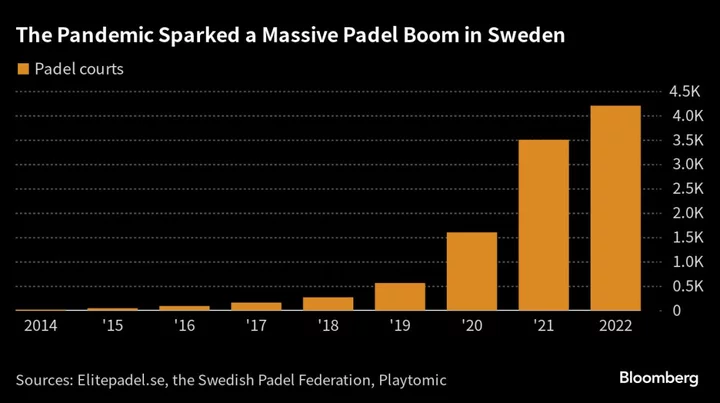
Sweden Holds Grim Warning for the $4 Billion Padel Craze
Padel, the racket sport craze currently sweeping across much of the planet, has turned into a cautionary tale
2023-09-16 14:50
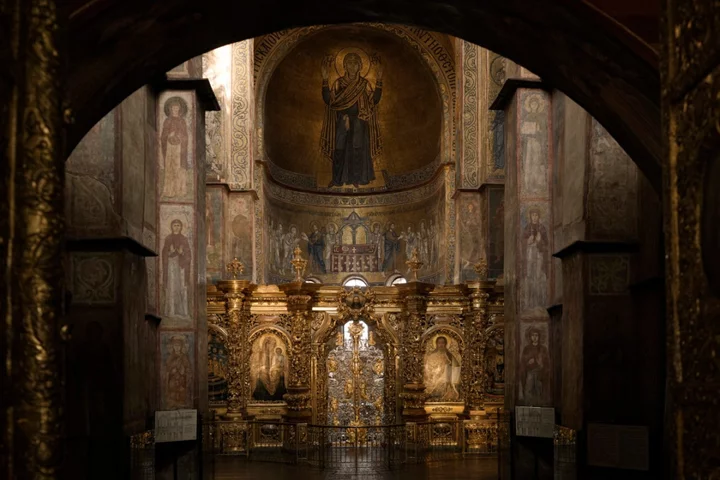
Unesco adds two locations in war-ravaged Ukraine on its list of historic sites in danger
The UN's World Heritage Committee has placed two major historical sites in Ukraine on its list of such sites that it considers to be in danger. The iconic Saint Sophia Cathedral in the capital, Kyiv, and the medieval center of the western city of Lviv, are UNESCO World Heritage Sites central to Ukraine's culture and history. The decision announced on Friday to put those two on the body's list of sites “in danger” has no enforcement mechanism, but could help deter Russian attacks. Neither site has been directly targeted since Russia invaded Ukraine in February 2022, and Lviv has largely been spared from the fighting. But Russia has unleashed waves of strikes on Kyiv and other cities, hitting residential areas and critical infrastructure with Iranian-made attack drones. The decision was taken at the 45th session of the World Heritage Committee, which is being held in Saudi Arabia. The committee maintains UNESCO's World Heritage List and oversees conservation of the sites. The gold-domed Saint Sophia Cathedral, located in the heart of Kyiv, was built in the 11th century and designed to rival the Hagia Sophia in Istanbul. The monument to Byzantine art contains the biggest collection of mosaics and frescoes from that period, and is surrounded by monastic buildings dating back to the 17th century. The Kyiv-Pechersk Lavra, also known as the Monastery of the Caves, is a sprawling complex of monasteries and churches — some underground — that were built from the 11th to the 19th century. Some of the churches are connected by a labyrinthine complex of caves spanning more than 600 meters (2,000 feet). The two sites on the Dnipro River, a 15-minute drive from one another, are “a masterpiece of human creative genius," according to Unesco, the UN Educational, Scientific and Cultural Organization. The other site is the historic center of Lviv, near the Polish border. A 5th-century castle overlooks streets and squares built between the 13th and 17th centuries. The site includes a synagogue as well as Orthodox, Armenian and Catholic religious buildings, reflecting the city's diversity. “In its urban fabric and its architecture, Lviv is an outstanding example of the fusion of the architectural and artistic traditions of Eastern Europe with those of Italy and Germany,” Unesco said. “The political and commercial role of Lviv attracted to it a number of ethnic groups with different cultural and religious traditions.” Lviv is more than 500km from Kyiv and even further from any front lines, but it has not been spared. Russian cruise missiles slammed into an apartment block in the city in July, killing at least six people and wounding dozens. Unesco added Ukraine's Black Sea port city of Odesa to its list of endangered heritage sites in January. Russian forces have launched multiple artillery attacks and airstrikes on the city, a cultural hub known for its 19th-century architecture. Russia says it only strikes military targets. Under the 1972 Unesco convention, ratified by both Ukraine and Russia, signatories undertake to “assist in the protection of the listed sites” and are “obliged to refrain from taking any deliberate measures” that might damage World Heritage sites. Inclusion on the List of World Heritage in Danger is meant to rally urgent international support for conservation efforts. The list includes more than 50 sites around the world. Read More Ukraine-Russia war – live: ‘Significant losses’ for Putin’s forces as Kyiv retakes village and attacks ships Ukraine recaptures another village from Putin’s forces – as it keeps up attacks on Russia’s ships Putin meets the leader of Belarus, who suggests joining Russia's move to boost ties with North Korea Ukraine war’s heaviest fight rages in east - follow live Charity boss speaks out over ‘traumatic’ encounter with royal aide
2023-09-16 14:49
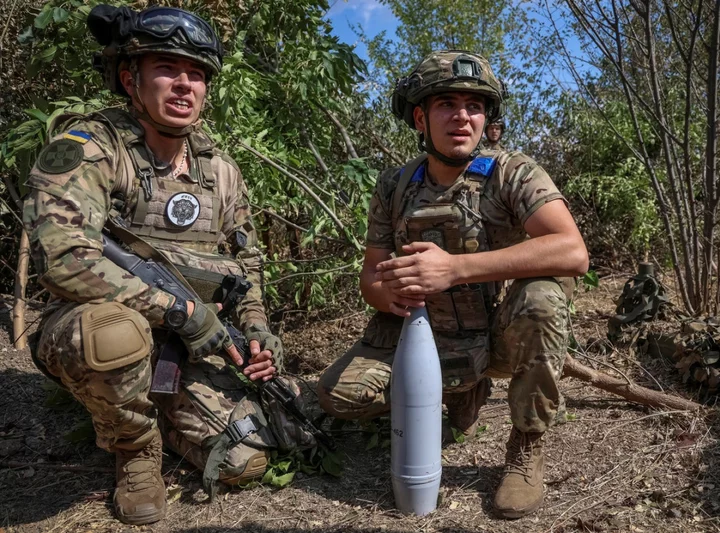
Ukraine-Russia war – live: ‘Significant losses’ for Putin’s forces as Kyiv retakes village and attacks ships
Ukraine has claimed fresh success in its counteroffensive against Vladimir Putin’s forces, with the recapture of another village – a liberation that the army says is “key to success in all further directions”. The announcement by the General Staff of Ukraine’s armed forces said that Russian forces had faced “significant losses” in the battle. Kyiv’s forces are seeking to reclaim land occupied by Moscow across multiple areas of southern and eastern Ukraine. The village of Andriivka is about 10 kilometres south of the Donetsk town of Bakhmut, which Russia captured in May after some of the bloodiest fighting of the war. Meanwhile, Britain’s most senior military officer said Ukraine had taken the initiative over Russia with its offensive, even if gains are gradual. Sir Tony Radakin said: “In the north they are holding and fixing Russian forces there and in the south they are making progress between 10 and 20km.” His comments came as Ukraine president Volodymyr Zelensky hailed Ukraine’s destruction of a Russian air defence system in the annexed Crimea peninsula. Read More Kim Jong Un stops to see a fighter jet factory as Russia and North Korea are warned off arms deals She danced with Putin at her wedding. Now the former Austrian foreign minister has moved to Russia What is a Storm Shadow cruise missile?
2023-09-16 14:18
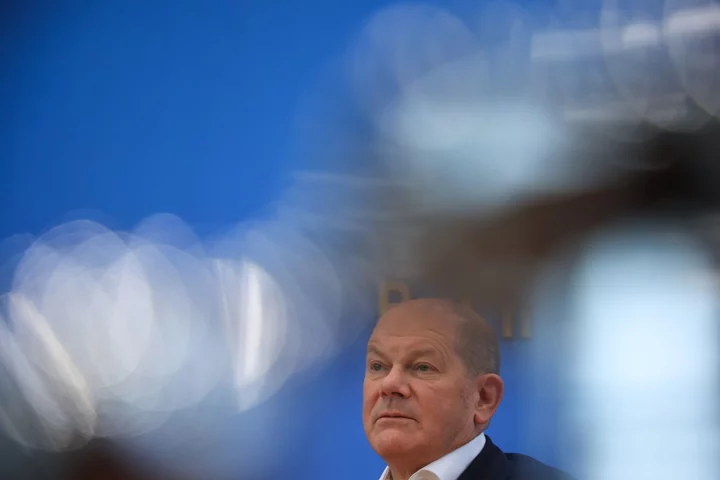
Scholz’s Dream of Climate Revolution to Revive Germany Is Dying
Chancellor Olaf Scholz is struggling to pull off his plan to harness the transition to green energy and
2023-09-16 13:59
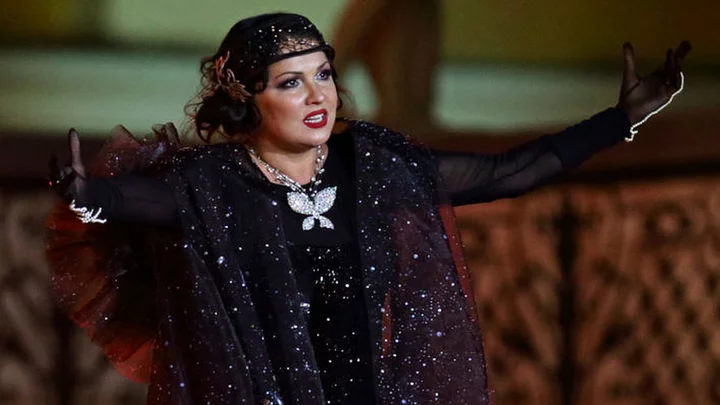
Berlin protesters condemn Russian soprano Netrebko's opera performance
Anna Netrebko has been accused of failing to denounce Vladimir Putin for Russia's war in Ukraine.
2023-09-16 02:56

TikTok fined $368 million in Europe for failing to protect children
A major European tech regulator has ordered TikTok to pay a €345 million ($368 million) fine after ruling that the app failed to do enough to protect children.
2023-09-15 23:57
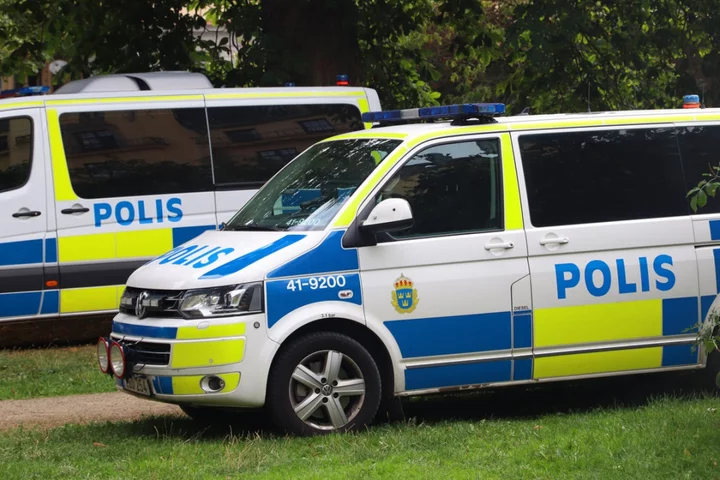
Teenager is latest victim of spate of deadly shootings across Sweden
A teenager has died after being shot in the southern suburbs of Stockholm – one of a spate of shootings in the country across the last week. Police received were called after loud bangs were heard in Vastertorp at around 8pm local time on Thursday, with the injured boy – whose age was not given – taken to hospital before dying of his wounds overnight. The other shootings include four in the university city of Uppsala – two of them fatal – and two others in Stockholm, where a 13-year-old teenager lost his life. Stockholm police said they were still seeking a suspect. “I don't have a clear answer as to whether this is connected to other murders recently, but it is something we are investigating,” said spokesman Towe Hagg. Sweden has faced an increase in recent years which police and authorities blame on criminal gangs fighting over arms and drug trafficking, using guns and explosive devices.. Earlier this week, the national police chief, Anders Thornberg told a press conference, that this wave of violence had reached an "unprecedented" level. “There have recently been after on an unprecedented scale,” Mr Thornberg said. “Several boys aged between 13 and 15 have been killed, the mother of a criminal was executed at home, and a young man in Uppsala was shot dead on his way to work,” he added. “Citizens are afraid, insecurity is increasing. And this at a time when we have raised our terrorist alert level in the country,” Mr Thornberg said. A number of crimes by gangs had been foiled in recent days, the police chief added, saying that such preventative work was key. “Several people have been arrested and weapons confiscated in Uppsala alone, where the situation is very serious,” Ulf Johansson, a police officer in the region, about 40 miles (65km) north of Stockholm. Up until the end of August this year – so not including the recent spate of incidents – there were 247 shootings across Sweden, according to national statistics. Those led to 30 deaths. Seventy-six of those incidents occurred around the region of Stockholm. In 2022, 62 people were killed in 391 shootings across the country, with 128 of those incidents around the Stockholm region. When announcing those statistics in December, the justice minister, Gunnar Strommer, called it a modern-day record. "Deadly gun violence has increased and unfortunately has hit a new, bloody record this year," he said. Mr Strommer said at the time that those 62 deaths compared to four in Norway, four in Denmark and two in Finland. In 2021, 45 people were shot dead in Sweden. In 2012, the total was 17 Also last year, there were 90 explosions and 101 attempted explosive attacks were recorded, according to the data. So far this year, more than 100 explosions have already been recorded. Sweden has gone from having one of the lowest incidences of gang violence to one of the highest over the last 20 years, according to the Swedish National Council for Crime Prevention, with the current government vowing to crackdown on gang crime. Read More Nobel Foundation raises the amount for this year’s Nobel Prize awards to 11 million kronor Things to know about Sweden's monarchy as King Carl XVI celebrates 50 years on the throne Sweden's figurehead king celebrates 50 years on the throne On the brink of joining NATO, Sweden seeks to boost its defense spending by 28% Sweden brings more books and handwriting practice back to its tech-heavy schools Trial starts in Sweden of 2 oil executives accused of complicity in war crimes in Sudan
2023-09-15 22:48
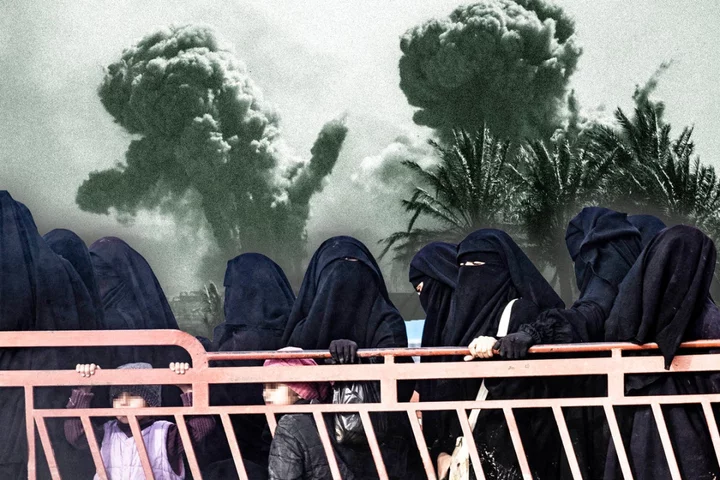
She was forced to live under Isis in Syria as a child and then stuck in a refugee camp. Finally she is home
In a courtyard in the shadow of Tirana’s largest mosque sits Emina. A gloved hand reaches out for a can of Pepsi, which she sips as she watches the city around her. Although she was born in Tirana, it is unfamiliar: her formative years, and most of her memories, were shaped in Baghuz and Raqqa, in Syria. Both cities were held for years by the jihadist group Isis, known locally as Daesh. Emina has been back in Tirana for just a month. She is still only 16. A quiet and withdrawn figure; her soft voice is barely audible. Life in Albania is a new and difficult adjustment, but she is certain that leaving Syria was the right decision. "Life is much better here, so much better than where I was”. Emina is accompanied by her grandmother and cousin. All three are wary of having their photographs taken, given what they have been through. They are a religious family: both wear the hijab, rather than a burqa like Emina. Her grandmother, a woman in her 70s, lived under the communist regime of Albanian former leader Enver Hoxha, when religion was banned by the state. Both forms of dress are still uncommon in Albania. The bright pastels of their hijabs contrast with Emina’s black burqa, a mark of the practice of two very different forms of Islam. Emina was taken to Syria as a young child by her mother and father, in 2015. For almost nine years of her life she was in Syria, first in Raqqa, then in Baghuz – the last stronghold of Isis in the country – and then, after it fell in 2019, in Al Hol, the refugee camp which is filled with the wives and children of Isis fighters. “Life in Baghuz felt normal, because I was so young, and we never left the house, " Emina says. "For a year, the war seemed far away”. But the war found them, as wars do. Baghuz was the final town of the once-vast caliphate to fall, following a month-long assault by coalition fighters aided by American airstrikes. Her father died in the battle. Emina, her mother and her sister were then moved to Al Hol. By some estimates, there are more than 50,000 women and children in the Al Hol camp. It is guarded by the Syrian Democratic Forces (SDF), made up of mostly Kurdish forces. They also guard the thousands of former fighters, both foreign and local, who languish in prisons in northeastern Syria. Albania's government has offered a way back for any Albanian citizen who wants to leave the camp: the women who remain there all know how they can alert the authorities and begin their journey home. If they do so, they are moved to the Al Roj camp, about 50 miles north, where their name and details are recorded. From Al Roj, the authorities take them home to Albania. In leaving Al Hol, towards the end of 2022, Emina abandoned her mother and sister. She has likely destroyed any future relationship with them and may never see them again. They did not want her to leave; they remain convinced Isis will rise from the ashes. They are not alone. Masoud Mostajabi, deputy director of the Middle East programmes at the Atlantic Council think tank, believes Isis will once again terrorise the region. Yet, distracted governments have little time for these warnings. The US has “done a great job at convincing itself that the threat from Isis is gone,” Mostajabi says, “but on the ground, authorities fear a revival”. In Tirana, the love and concern Emina's grandmother and cousin have for her is clear from the way they watch her as she speaks; there is great sadness in their eyes as she describes her time in Syria – but they still smile at her for encouragement. It is difficult to comprehend the level of suffering this slight girl has faced. Emina’s grandmother is the most talkative of the three: speaking with conviction about the suffering of their family, and how Emina has been treated upon her return. Her eyes fill with tears as she speaks: “Above all, the Albanian government practises a human approach. They see her as a real person”. It is impossible to commit to bringing back all who live in the Syrian camps, not least as some wish to stay. But the Albanian government has tried hard to ensure that there is a path for all women and children who wish to return. It is a marked difference with the British government, which has not given British citizens a pathway to return from Syria. Only in October 2022 was a British woman – who has not been named – allowed to return from Al Hol: she is the first and only adult returnee since the fall of Isis. Three children have been returned. It is estimated that around 60 Britons, including 35 children, still remain in Syria. In other cases, the British government has made leaving Syria impossible: the most famous example being Shamima Begum, who left Britain at 15 to join Isis. She has had her British citizenship revoked, on the grounds that she can claim citizenship in Bangladesh. (It is against international law to render an individual stateless). The Bangladeshi government has disputed this and said that Begum cannot enter Bangladesh. In 2019, the foreign minister, Abdul Momen, said that were she to try and enter, she would face the death penalty. Almost all European countries initially refused to return their citizens from Al Hol. But in the years since, some have slowly relented. A decision by the European Court of Human Rights may have been a factor: in late October 2022, the court ruled in favour of two French women who had argued that the French government’s refusal to bring them home violated their right to enter the territory of their nationality. The French government lost the case and were forced to re-examine the cases of both women. The ruling did not stipulate that all citizens must be returned, just that an independent body should examine cases. Life in Baghuz felt normal, because I was so young, and we never left the house Emina, talking about the start of her life under Isis The ruling may have pushed France to act: a week later, it repatriated 55 of its citizens. In January, it repatriated another 47 people. Canada and Australia have recently repatriated a number of their citizens, after refusing to do so for quite some time. Britain, by continuing to ignore its citizens in Syria, may become an international outlier. The British citizens who remain in Al Hol are despondent. Julian Kasapi, who visited the camp, said a British woman pleaded for help when she realised he could speak English: “no one is coming for me”, she told him. Emina spoke of three orphans, British children, who would wander around the camp by themselves. Albanians who choose to stay in Al Hol say they fear what awaits them at home, according to those who have visited the camps. Those who remain in Al Hol are watched over by the most devout women there, those who are still firmly committed to the extremist Isis ideology, and believe that that Isis will inevitably rise again. Some of these women are likely to have been recruiters, or more involved in the organisation. (Women and children from Syria and Iraq are housed in a separate part of Al Hol.) Their watchful eye means that no woman in the camp is safe to remove a burqa, even to wear a hijab. To do so would be a statement of disbelief, and would put a woman’s life in danger. Emina was watched over by such devout Albanian women, with whom she shared a tent. “They tell you that when you return to Albania, you will not be able to practise Islam”, she says. The women who watched over Emina told her that a life in Albania would mean certain isolation, imprisonment and loneliness. She did not believe them, and knew she wanted to return home. “When I made the decision to leave, at first they told me not to go. Then, they told me they would kill me’. Some girls have spent most of their life under Isis or within the camps: what they are told about the outside world can seem real, because they have so little experience of it. Indrit Doda, who leads the anti-terror unit in the Albanian police, was involved in missions to help return Albanian women and children from Al Hol. “We spent hours in negotiations with them, trying to convince them that they would be safe if they returned home”, he says, “it was very hard to get through to them”. Although the camps are in northeastern Syria, they are controlled by Kurdish forces rather than the Syrian government. “It was very difficult at the beginning”, says Doda. “Albania is not a big player on the international stage. We did not have established means of communication with the right groups in the Middle East”. Rounds of negotiations took them to Lebanon and elsewhere. But they persisted, and eventually established a route for Albanian women and children to return home from the camps in Syria, if they so desired. Back in Tirana, it is clear that any fears over safety are unfounded. The government prides itself on its efforts to bring home and re-integrate women and children who have lived under Isis. Much is put into ensuring those who return may re-integrate into society successfully. As soon as they arrive, their health and psychological state are reviewed. Both women and children receive psychotherapy for as long as is deemed necessary. For children, there is a focus on their education: they are not allowed to attend religious schools. They are assigned a teacher within their school to help with their reintegration, and receive extra lessons. “Many of them were out of school for years,” says Fatilda Smajlaj, who runs the reintegration programme within the Albanian government. To ensure they are not isolated in the school they attend, only their teacher and the headteacher are aware that they lived under Isis. Their reception from the government, and society at large, tends toward sympathy. Many are believed to have been tricked into going by their husbands (although in the case of Emina's mother she left willingly). Yet even women who choose to come back may still hold radical views and may not be reconciled to life in a secular country. They have chosen to return for the sake of their children's’ future, but they are still bitter about what they have been through: they have lived under bombing campaigns and as prisoners in the desert. Mothers who are still radicalised can do serious harm to their childrens’ reintegration. Fatilda speaks of women who would tear out the eyes of their child’s toys, burn their drawings and ban them from listening to music, because they believed they were ungodly. It is harder to work with them as they are more aware of their own suffering than their children. It is difficult to know how to measure success. The government puts women into programmes which teach them economic empowerment, and gets them back into education. For some, success is abandoning Islam altogether. Fatilda speaks of a family with three daughters, all of whom were wearing the burqa. They no longer wished to practice Islam but refused to abandon their burqas unless their mother did so as well. Eventually, she agreed. “She has now integrated into Albanian society,” Fatilda says, and has gone back into education:, “this is a story of success”. For others, success is about learning to live in Albania and practice their faith. The government has put great efforts into consulting with local Imams to ensure that reintegration is palatable for those who wish to retain their devotion. “The Imams help address the way women think about Islam,” says Fatilda. As they have lived under such a strict religious doctrine it is often difficult for them to adapt to life as a religious person in a secular country. Under Communist rule, Albania was an atheist state. Religious beliefs were completely banned under the constitution. Even the Soviet Union (which made great efforts to eliminate religion) never banned it entirely. As in many former Communist states, religion has been re-adopted. Albania is more than 50 per cent Muslim, and there is a significant Christian population. Religion is celebrated in Albania for its cultural traditions, rather than its moral guidelines. Christians and Muslims will celebrate each other's festivals. Devout religious practice is uncommon in Albania. This is why many who return fear they will be ostracised if they continue to practice a stricter form of Islam than is typical. These fears are unjustified, according to Emina’s family. Emina's fate differed from that of another girl, Drita. She is 18, and like Emina, has spent most of her childhood in Syria. Drita’s uncle, Gentijan, lives in Tirana and has spent years trying to bring her home. He believes that it is the influence of the women who have chosen to stay in Al Hol that has meant Drita has chosen to do the same, even though she has been given the option to return to Albania. Drita and her brother, Altin, were taken to Syria as children by their father. They believe he became radicalised after working for a short period as a plumber in Saudi Arabia. When he returned, he had changed completely: he stopped drinking and avoided his friends. But he remained a kind husband and was still devoted to their family, according to Gentijan. “It was an act, of course, to keep us from being suspicious,” he says. In January 2014, he told his wife he was taking the children on holiday to Montenegro, but instead took them to southern Turkey, where they crossed into Syria. The children were six and seven years old at the time. By the end of summer, he was dead. The children were left alone. Word reached the rest of the family that the children’s father had died. Yet Isis were still in control and there was no way for the children to leave. And they were still very young: too young to understand their circumstances, and what it would mean to be raised as an orphan in a country thousands of miles from home. This was not lost on their grandmother, Bleona, back in Albania. For them, she made a great sacrifice: she chose to leave for Syria to live with them. She had never been a religious woman, yet she donned a burqa and chose to live under the rule of Isis, so her grandchildren would not have to do so alone. When Isis was forced out in 2019, Altin, Drita and their grandmother were moved to Al Hol. Here they waited, hoping that the government might be able to bring them home to Albania. By 2021, they had been in Syria for seven years. But by the time the path was cleared for them to do so, their grandmother had died suddenly. She had been a healthy woman in her 60s, with no previous health concerns. Her death is a testament to the terrible conditions in Al Hol. Its residents live in dire poverty, with little access to medical care. Disease is common. Soon after, the children decided to return home. But while they were waiting on legal guarantees from the government, Drita, seemingly embittered and saddened by the death of her grandmother, changed her mind. She chose to stay, and remains in Al Hol. Drita occasionally sends her uncle messages on WhatsApp. The messages are short, sporadic, and to the point: “I am fine” one reads. It might be weeks between messages., Gentijan knows her communications are likely being watched, because the phone she texts them from belongs to another woman – famed for her extremist beliefs among Albanians in Syria – who has chosen to stay in Al Hol. “She can’t speak openly. She cannot express her concerns because she fears the other women with her”. Gentijan believes she wants to return home, but fears about what would happen if she tried to leave. “She keeps her life together by playing an act of wanting to stay there,” he says. In a conversation where he believed she was speaking openly, she told him that she never imagined she could have suffered so much in life. But if she expressed a will to return, Gentijian believes she would risk being killed: “They have no respect for human life whatsoever”. To the credit of the Albanian government, they have visited Al Hol three times to try and return her. But she would not come. The longer people spend in the Al Hol camp, the more dangerous it is for the countries they might return to, according to Emina. They risk becoming re-radicalised, and “every day they are there, they risk their life”. She says that any unaccompanied children are preyed upon by the most radical who remain. The danger incentivises children to seek refuge from anyone who might look after them. “Two weeks after I left Al Hol, two children in the camp were murdered,” says Emina. Returning women (and their children) from Syria is controversial: while some see them as terrorists, in others they inspire sympathy. Many women can claim to have stayed home: the only parts of the caliphate they knew well were between the four walls of their home. They cooked and cleaned, and as some claim, lived a life entirely separated from the terror that reigned outside. All those who remain in Syria are an unfair burden upon the SDF as they still pose a significant threat to the region. In February, US Senators described the camps as “hotbeds for radicalisation”. In late November, Turkish strikes in the region threatened their existence altogether: the SDF said they would no longer have the capacity to guard the compounds if Turkey launched an incursion in northeastern Syria. Repatriating Isis fighters to face prosecution in their home countries is even more unpopular than repatriating their wives and children. It would also be difficult to prosecute fighters for the particular crimes they have committed: collecting evidence may be challenging, expensive or impossible. Few countries have tried to bring home fighters, even Albania has not repatriated any. It is an issue that all countries will have to deal with eventually – leaving them in Syria may be politically convenient, but is not viable in the long term. Many European countries have avoided repatriating them because they would rather not deal with the consequences of doing so: trials, prisons and reintegration are all expensive. Those who remain in Syria pose a threat to the region, and a greater threat to their home countries the longer they are kept there. Bringing home women and children is a step in the right direction. The number of Albanians who left for Syria is naturally much smaller than those from Britain, France or other large European states; its population is around 2.8 million. The process of bringing women and children home, and eventually re-integrating them into society, is simpler when their numbers are smaller. But it is also true that Albania is a considerably less wealthy country than many of its European neighbours. Even with its smaller state capacity and international presence it has managed to repatriate and re-integrate women and children into Albanian society. Albania shows that if a government is determined enough, it can return its citizens. Emina is an example of the happiness that can come about through repatriation. That her sister and mother choose to stay in Syria is painful for her and her family. Like many of the others who remain, they believe the lies they are told about how they will be treated if they return to Albania. But her presence helps alleviate her family’s suffering. “There is nothing more beautiful than having her home,” her grandmother says through tears. Emina's return gives her the ability to choose the direction of her life, rather than have it decided for her as she wastes her youth in a tent in the desert. She has freedom, she has an education, and she has her religion: she is living proof that the lies women are told by some in Al Hol are unfounded. Read More They were murdered by Albania’s communist regime. Three decades on, families are still searching for their remains Ukraine war: ‘Significant losses’ for Russia as Kyiv retakes village and hits ships Apple will update iPhone 12 in France after regulators said it emitted too much radiation Volodymyr Zelensky set to meet Joe Biden in Washington in his second trip since war
2023-09-15 21:49
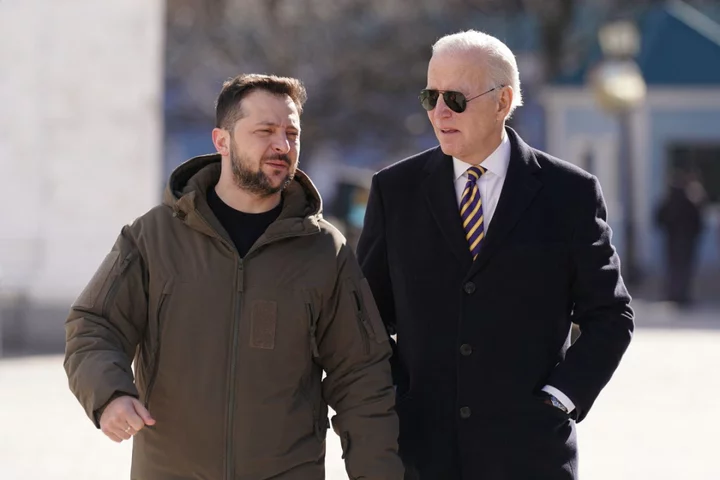
Volodymyr Zelensky set to meet Joe Biden in Washington in his second trip since war
Volodymyr Zelensky is likely going to meet Joe Biden at the White House and also visit Capitol Hill in a diplomatic trip to Washington next week, suggested several media reports. The Ukrainian president’s second visit to the US since Russia’s invasion comes at a time Congress is mulling Mr Biden’s request to assist Ukraine with as much as $24bn (£19bn) in military and humanitarian aid. The visit also comes when Western leaders have defended Ukraine’s counteroffensive against Russia, that officials under the condition of anonymity have said has been slow to take off. On Friday, Ukraine announced it had liberated a village near Bakhmut in a “lightning operation” after fierce fighting with Russian troops amid its counteroffensive. Mr Zelensky will meet the US president at the White House next Thursday, an administration official said on the condition of anonymity. Two congressional aides confirmed the war-time president’s trip to the Capitol. The two leaders could also attend a meeting of the UN General Assembly (UNGA) in New York to be held on 18-19 September. The White House National Security Council, however, has declined to comment on Mr Zelensky’s plans. That includes the likely meeting between the two presidents at the White House. This will be Mr Zelensky’s second visit to the US and also be only the second time he has ever visited any country abroad since the invasion in February last year. He had made a grand visit to the US in December last year and delivered an address to the US House of Representatives. In a bid to boost Ukraine’s military capabilities, Mr Biden sought a package of $13.1bn in additional military aid and another $8.5bn for humanitarian support, which also includes $2.3bn for financing and to catalyse donors through the World Bank. However, he is faced with pushback from conservative Republican lawmakers who have been calling for broad federal spending cuts and some of those allied with Donald Trump as they specifically look to stop money to Ukraine. The Congress is facing increasing strife over providing additional funding for Ukraine as the war is well into its second year and working to pass its annual appropriations bills before the 30 September deadline to keep the US government running. Mr Zelensky is likely slated to deliver a speech to the UNGA and also reportedly looking to hold meetings with other visiting world leaders. This has been claimed by Israeli prime minister Benjamin Netanyahu, who said he planned to meet Mr Zelensky on the sidelines of the UN meetings. Additionally, the US is looking to impose new sanctions on more than 150 individuals and entities related to Russia’s invasion of Ukraine. “The US was continuing our relentless work to target Russia’s military supply chains and deprive (Russian president Vladimir) Putin of the equipment, technology, and services he needs to wage his barbaric war on Ukraine,” Treasury Secretary Janet Yellen said. Read More Isolated Putin and Kim lay groundwork for second summit – as pair warned over ‘price to pay’ for cooperation Ukraine-Russia war – live: Kyiv is pushing ‘Putin forces back’ says UK as damage to Crimea fleet revealed Ukraine liberates village near Bakhmut amid Russian losses in east and south Ukraine ‘holds initiative’ in counteroffensive against Russia, says UK military chief Kim Jong Un stops to see a fighter jet factory as Russia and North Korea are warned off arms deals
2023-09-15 16:53

European shares set to end week higher after ECB signals end to rate hikes
By Bansari Mayur Kamdar European shares extended their rally on Friday, on track to end the week higher,
2023-09-15 16:18
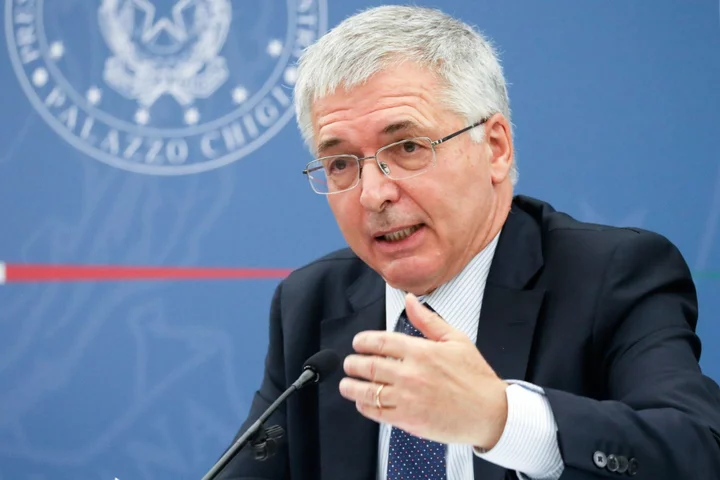
Battle for EU Top Jobs Pits Spain in Status Duel With Italy
The European Union’s next contest for a top job risks turning into a showdown between its two key
2023-09-15 15:57
